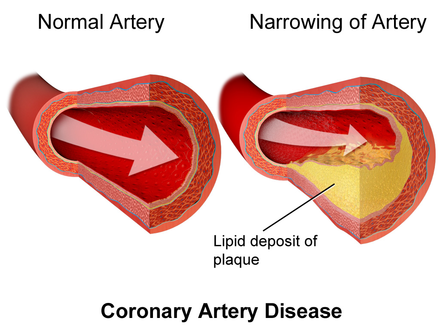Coronary Artery Disease
Coronary artery disease (CAD), also known as coronary heart disease (CHD), involves the reduction of blood flow to the cardiac muscle due to a build-up of atherosclerotic plaque in the arteries of the heart. It is the most common type of cardiovascular disease, presenting as stable angina, unstable angina, or myocardial infarction.
Signs and Symptoms
The most common symptom of CAD is chest pain or discomfort, often described as pressure, tightness, or squeezing, which may radiate to the shoulder, arm, back, neck, or jaw. This symptom, termed angina, usually occurs with physical exertion or emotional stress and improves with rest.
Shortness of breath is another common symptom. In some cases, CAD may be asymptomatic until a heart attack occurs.
Complications of CAD include heart failure, abnormal heart rhythms, heart attack, cardiogenic shock, and cardiac arrest.
Symptoms in Females
Females may experience different symptoms than males, such as shortness of breath, extreme fatigue, sleep disturbances, indigestion, and anxiety. Chest pain may also be present but is less commonly reported by females.
Risk Factors
CAD is primarily caused by atherosclerosis, the build-up of plaques in the coronary arteries. Major risk factors include high blood pressure, smoking, diabetes, lack of exercise, obesity, high blood cholesterol, poor diet, depression, and excessive alcohol consumption.
Genetic predisposition and lifestyle factors, such as lack of exercise and a poor diet, contribute significantly to the risk.

Diagnosis
The diagnosis of CAD involves a combination of patient history, physical examination, and diagnostic tests. Common diagnostic methods include:
- Electrocardiogram (ECG): Measures the electrical activity of the heart.
- Cardiac stress test: Assesses the heart's function under stress.
- Coronary computed tomographic angiography (CTA): Visualises the coronary arteries.
- Coronary angiogram: Provides detailed images of the coronary arteries.


Treatment
Lifestyle Changes
Preventive and treatment strategies for CAD emphasise lifestyle modifications, including:
- Healthy diet: Emphasising fruits, vegetables, whole grains, and lean proteins.
- Regular exercise: Engaging in physical activity to improve cardiovascular health.
- Maintaining a healthy weight
- Smoking cessation
Medications
Medications are often prescribed to manage CAD and reduce the risk of complications:
- Aspirin: Reduces the risk of blood clots.
- Beta blockers: Decrease heart rate and blood pressure.
- Nitroglycerin: Relieves chest pain.
- Statins: Lower cholesterol levels.
Surgical Interventions
In severe cases, surgical procedures may be necessary:
- Percutaneous coronary intervention (PCI): Opens narrowed arteries using a balloon and stent.
- Coronary artery bypass surgery (CABG): Redirects blood flow around blocked arteries using grafts.
Epidemiology
CAD is a leading cause of death worldwide, responsible for 8.9 million deaths in 2015. The prevalence of CAD increases with age, and it is more common in males than females.
While the incidence of CAD has decreased in developed countries, it remains a significant public health concern globally.


Understanding CAD's risk factors, symptoms, and treatment options is very important for dental professionals, as they may encounter patients with this condition and need to manage their dental care accordingly.
Self-assessment MCQs (single best answer)
What is the primary cause of coronary artery disease (CAD)?
Which of the following is a common symptom of coronary artery disease?
Which diagnostic test is primarily used to visualize the coronary arteries in CAD?
Which lifestyle change is NOT recommended for preventing or managing CAD?
What medication is commonly prescribed to lower cholesterol levels in CAD patients?
Which surgical procedure involves redirecting blood flow around blocked coronary arteries?
What is a major complication of untreated coronary artery disease?
Which risk factor is most strongly associated with the development of CAD?
What is the primary mechanism by which atherosclerosis leads to CAD?
Which of the following symptoms is more commonly reported by females with CAD compared to males?
Dentaljuce
Dentaljuce provides Enhanced Continuing Professional Development (CPD) with GDC-approved Certificates for dental professionals worldwide.
Founded in 2009 by the award-winning Masters team from the School of Dentistry at the University of Birmingham, Dentaljuce has established itself as the leading platform for online CPD.
With over 100 high-quality online courses available for a single annual membership fee, Dentaljuce offers comprehensive e-learning designed for busy dental professionals.
The courses cover a complete range of topics, from clinical skills to patient communication, and are suitable for dentists, nurses, hygienists, therapists, students, and practice managers.
Dentaljuce features Dr. Aiden, a dentally trained AI-powered personal tutor available 24/7 to assist with queries and provide guidance through complex topics, enhancing the learning experience.
Check out our range of courses, or sign up now!


